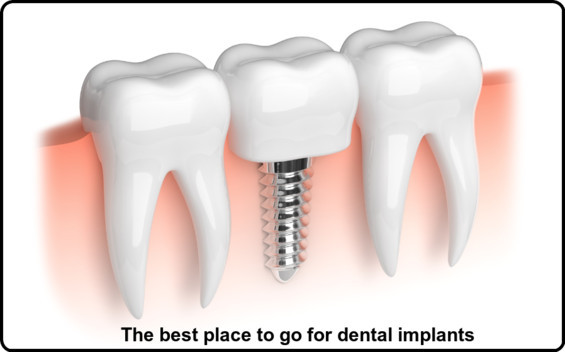Crown or a dental implant
Trying to decide whether to have a crown or a dental implant, there are pros and cons to dental crowns and dental implants.
Let’s take a balanced look at why you should consider a crown or a dental implant, read on and find out what is the best advice for you as each persons teeth are unique to them.
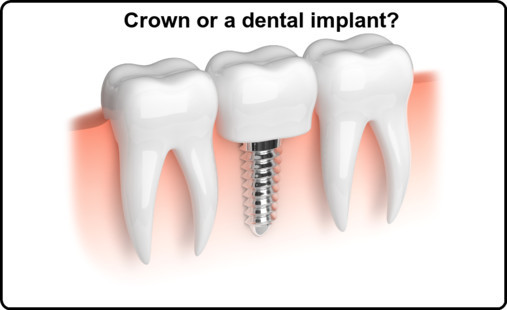
There are a number of things that you should know about a crown or a dental implant that can affect your decision as to what is the best treatment for you.
Whilst a dental crown or dental implant are both effective solutions to replace a missing tooth there are major differences between them.
At Hungarian Dental Implant Centre Wexford we have over the last 12 years fitted thousands of Irish people with a crown or a dental implant so we fully understand each option for those with a broken or missing tooth.
We look forward to offering you free advice n crowns and dental implants based on our extensive experience, to book a free consultation call Fintan on 0873490104.
Crowns or implants what is the difference
There are some significant differences between a dental crown and a dental implant, a dental crown is a cover or cap that slips over top of a tooth.
Whereas a dental implant is a substitute for a missing or cracked tooth, a dental implant consists of root replacement, an abutment connects the crown to the root.
Don’t be mislead by the fact that a crown or dental implant both incorporate a crown within their structure, some people imagine that they are interchangeable, it’s TRUE that the crown in both cases are essentially the same.
However, the significant difference even though both of them are manufactured from various metals so that they feel and look like natural teeth.
The essential difference is that a crown fits directly over a tooth a dental implant is a direct replacement for a missing or extracted tooth.
It is attached to an abutment whereas a crown fits over an original tooth.
Which is best for you
Our experienced dentists’ can help you decide whether a crown or a dental implant is best for your situation.
Oftentimes the reason for restoring or replacing a tooth will form the basis for the dentists’ opinion on which option is best for you, each solution is solving a different problem.
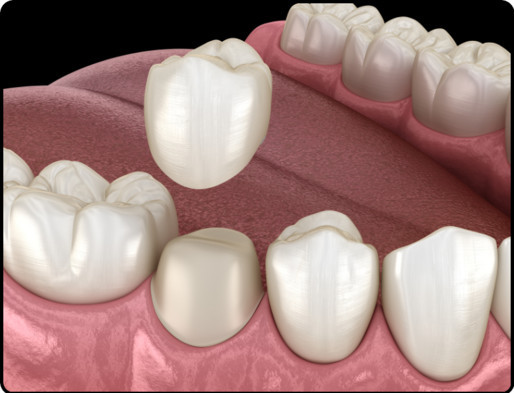
What are crowns for
Essentially crowns are the ideal solution when tooth decay has impacted a large proportion of the tooth, in a case like this the dentist may recommend a dental crown.
Once the decayed part of the tooth has been cleared out the crown fits over the remainder of the tooth, effectively dealing it off and preventing any further loss.
Root canal treatment
Root canal treatment may be needed if bad bacteria travels from the surface cavity down to the pulp chamber, it is located at the centre of the tooth.
Bacteria can cause an infection in the nerves, blood vessels or gum tissue, the dentist will carry out root canal treatment to get rid of the infection.
A hole will be left behind following the clear out, a filling is needed to fill the hole, a dental crown is then fixed to the top.
Another situation where a dental crown would be utilized is when a tooth is chipped or cracked, a dental crown will not work unless it is attached to a tooth that is strong or big enough to support it.
A dentist will always do his best to save a tooth, however if the damage is too widespread it may need to be extracted.
Pros and cons of dental crowns
When you are looking at the pros and cons of a crown or a dental implant its important to get the facts, here are the pros and cons of a dental crowns:
- A dental crown is a highly rated effective treatment to reconstruct a damaged tooth of teeth
- A dental crown is effectively a cap over the tooth
- Aesthetically pleasing
- Support a cracked tooth by keeping it in position
- Provide protection following root canal treatment
- Less expensive than an implant
- Patient can keep the tooth
- Provide a strong foundation and support for decayed teeth
- Crowns can last between 5-15 years
Cons of dental crowns
- Dental cement used during the procedure may waste away over time
- Small risk of the crown becoming chipped
- Teeth need to be filed down not a pleasant experience
- Sensitivity may be heightened following the procedure, use a toothpaste for sensitive teeth, should dissipate after a couple of weeks
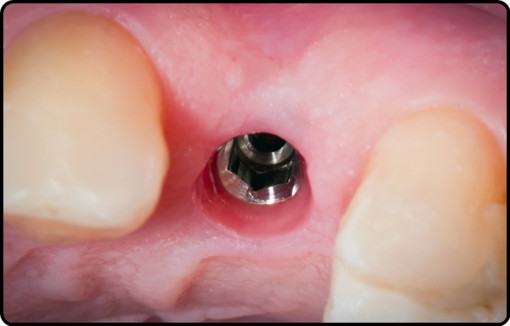
Pros and cons of dental implants
In the case of a missing tooth it’s not just that it affects a person’s smile, it can also have an effect on the other teeth around it, they can shift and move around into that empty space.
A missing tooth causes problems with talking, chewing and eating, until dental implants became available the only choice was a bridge and denture.
More and more people are opting for dental implants as a natural looking replacement for a missing tooth because of how they feel and look.
Surgery
A dental implant requires surgery, the dentist will drill a hole into the jawbone at the location of the tooth that is missing, a titanium support plus an abutment is fitted there.
Once the jawbone has healed and grown back a dental crown is placed there, in a few cases bone grafting may be needed if the bone has difficulty integrating with the post.
There are a few criteria before someone can be accepted for dental crowns, because it is a surgical procedure they must be in good health.
The success of the operation depends on the strength of the existing jawbone, a drill will be used so it must be able to endure that and to hold the post.
The success rate of dental implants is around 95-97% so it is feasible option for people that would like a missing tooth or teeth to be restored that look and feel great.
In general when the choice boils down to what is the best option for missing teeth crowns or a dental implant, if one can afford them dental implants are the better long term choice.
Pros of dental implants
- Dental implants are a full root and tooth
- Implants don’t affect the surrounding teeth
- Implants feel and look completely natural
- Implants offer less of a risk from infection
- Implants are a direct tooth replacement
- Implants are a better option for missing teeth
- With proper care dental implants can last a lifetime
Cons of dental implants
- Surgical procedure
- More invasive
- More costly
- Longer healing time
At Hungarian Dental Implant Centre Wexford we have over the last 12 years fitted thousands of Irish people with a crown or a dental implant so we fully understand each option for those with a broken or missing tooth.
We look forward to offering you free advice n crowns and dental implants based on our extensive experience, to book a free consultation call Fintan on 0873490104.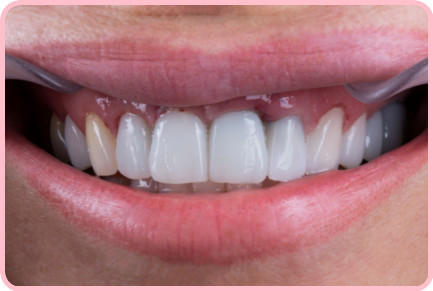
Length of time
The length of time for a crown or a dental implant has a bearing on the choice of procedure, the dental crown procedure happens in two parts.
At the first appointment the dentist will prepare the tooth and place a temporary crown over the tooth, an impression of the tooth will be taken from which a permanent crown is designed in the laboratory.
During the second appointment the temporary crown will be removed, then the permanent crown will be fixed into place, there may be a little bit if discomfort for the first few days so soft food is advised.
A dental implant requires a surgical procedure so it will take longer, there is a waiting period following the drilling and placement of the post.
It can take a number of weeks for the implant to fuse to the bone, if the patient requires bone grafts it will take longer even months.
While the patient is waiting for this to happen a temporary crown will be fitted on top of the implant until everything heals and is ready to take the crown.
Its important to point out that dental implant surgery is not risk free, cases are rate but the risk of infection is there because of surgery.
The drilling must be exact, if some other tooth were hit a blood vessel or nerve could be affected or the sinus cavity could be punctured.
How much do dental crowns cost
The choice of materials has a bearing on the cost of dental crowns, if gold is used it will push the price up, stainless steel is the next most costly, porcelain crowns are more popular with resin crowns being the cheapest.
In addition there is the cost of the abutment and post, in Ireland expect to pay between €800 to €1,000 for one porcelain crown.
At Hungarian Dental Implant Centre Wexford we can help you save a lot of money on dental crowns, why not give us a call on 0873490104.
How much do implants cost
A dental implant in Ireland can cost anywhere from €1,500 to €2,000, if you were prepared to travel to Hungary you could get the same procedure done for approximately €1,000 per implant.
You would have to factor in the extra time travelling to Hungary however flights and accommodation are a lot less expensive.
To find out more on the cost of a crown ir a dental implant contact us at Hungarian Dental Implant Centre Wexford.
Conclusion
Which is best, a crown or a dental implant, more than likely both may need to be replaced, both are good value for money, wear and tear due to chewing is a bigger issue for back teeth, usually they wear out first, a dental crown should last 5-15 years, a dental implant should last for 25 years plus.
To recap, a dental crown is the preferred option for a damaged or broken tooth providing most of the tooth is still there, a dental crown is less expensive than an implant, the procedure takes less time and is less invasive.
A dental implant is the preferred option for missing teeth, they are more expensive than crowns however they will last much longer up to 25 years in some cases, as long as the jawbone can support an implant they are the best option because they will look and feel the same as normal teeth.
Reference
https://www.ncbi.nlm.nih.gov/pmc/articles/PMC5086281/
.

